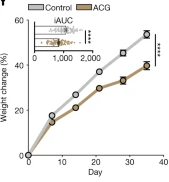A new approach to prevent weight gain during smoking cessation (SCWG) focuses on the gut microbiome and metabolites like dimethylglycine (DMG) and acetylglycine (ACG). This research indicates their significant role in SCWG and weight regulation in non-smokers, paving the way for new weight management strategies.
- Modalities for Weight Management: Development of treatments targeting these metabolites to aid in weight loss.
- Weight Modulation: Potential use of identified metabolites to control weight gain in populations that have difficulty maintaining a healthy weight (e.g., cancer patients).
- Prevention of Weight Gain in Smoking Cessation: Metabolite-based interventions that prevent SCWG, helping smokers quit without the concern of weight gain.
- Microbiome-Targeted Approach: Leverages the gut microbiome's role in weight regulation, offering a unique pathway.
- Evidence-Based: Supported by robust animal model data and preliminary human data, providing a strong foundation for further research and development.
Key microbiome-modulated metabolites linked to weight gain were identified, and their effect was demonstrated in mouse models. Preliminary human data in a small cohort further supports these findings. Results have been published in Nature. Clinical follow-up trials are already underway.

ACG supplementation of mice fed with a high-fat diet significantly reduced the weight gain rate.
Fluhr, L. et al. Gut microbiota modulates weight gain in mice after discontinued smoke exposure. Nature 600, 713–719 (2021).


